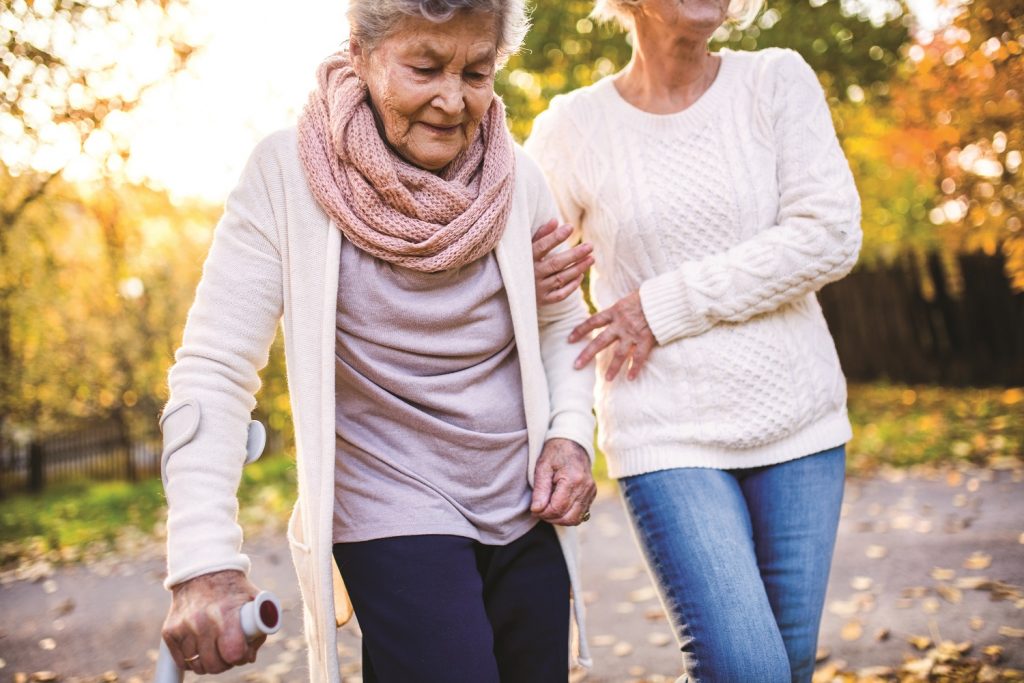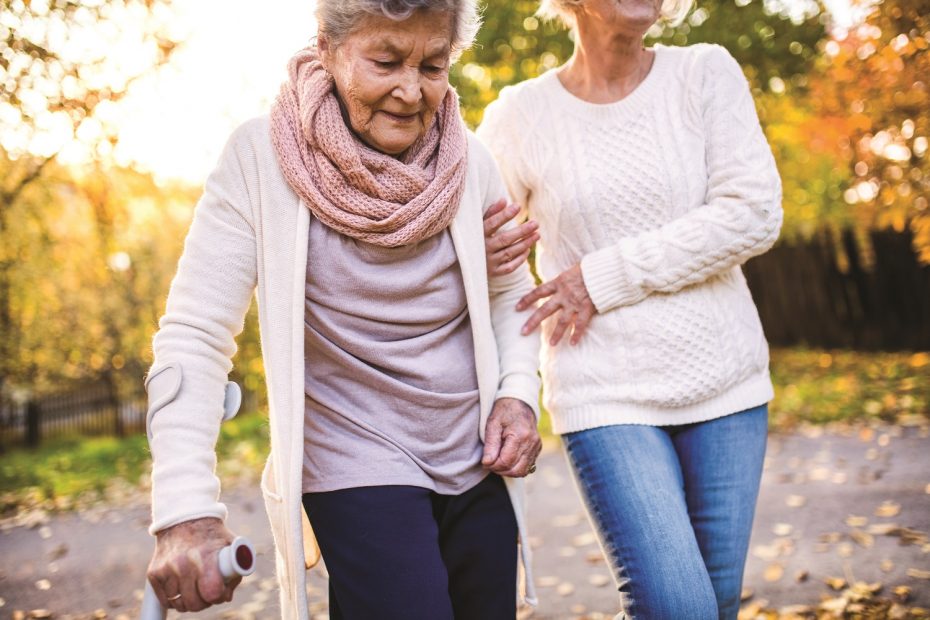
Feeling dizzy or lightheaded are common complaints among the senior population, affecting 24 percent of people age 72 and over. Although the symptoms are rarely life-threatening, dizziness and lightheadedness should be addressed right away to prevent a fall and subsequent injury.
What is dizziness?
Seniors who feel faint, woozy, weak, or unsteady may be experiencing dizziness. When the individual falsely perceives that his immediate surroundings are spinning, vertigo is the culprit. Frequent bouts of dizziness have a negative impact on a senior’s everyday life.
Vertigo is to blame when the senior feels as though he is off balance, spinning, whirling, tilting, or falling. The environment may seem to move when, in reality, there is no movement. A senior experiencing vertigo may have difficulty walking or standing; he may even lose his balance and fall.
What causes dizziness?
Four sensory systems (vision, sensory nerves, skin pressure, and inner ear) in the human body relay messages to the brain in order to maintain balance and orient a senior to his immediate surroundings. An interruption in these signals to the brain can cause a bout of vertigo.
An inner ear disorder, such as labyrinthitis, sends wrong signals to the brain. Vertigo occurs when these false signals are in conflict with other sensory systems in the body. An ear or head injury can also result in vertigo. Migraines and decreased blood flow to the brain cause vertigo, too.
Seniors are commonly prescribed medications. Taking excessive doses can result in dizziness. Mixing alcohol with medications can similarly cause vertigo or lightheadedness. Drug withdrawal or intoxication are known to cause issues with balance or experiencing a false sense of spinning surroundings.
Side effects from certain medications, such as tranquilizers, antidepressants and antiseizure medicines, may be to blame when vertigo strikes. Medicines that lower blood pressure can cause elderly individuals to feel faint, especially when the drugs lower the blood pressure significantly.
During hot summer weather, active seniors are prone to heat stress. Consequently, they can experience dizziness that comes from overheating (also known as hyperthermia). The feeling of dizziness is likely to occur when elderly individuals are dehydrated or take certain heart medications.
When should medical care be sought for vertigo?
Vertigo that is accompanied by a sudden change in speech, vision or other ability should prompt immediate medical attention. When loss of function occurs simultaneously with vertigo, a brain-related condition, such as a stroke or transient ischemic attack, may have occurred.
What is lightheadedness?
Lightheadedness is defined differently than dizziness. A person can feel dizzy without feeling his environment is in motion. Lightheadedness is in play when a senior feels he is about to faint or pass out. Feeling nauseous or vomiting may accompany lightheadedness.
What causes lightheadedness?
A brief drop in blood pressure and blood flow to the head can cause lightheadedness in seniors. Standing up quickly from a seated or lying position can provoke lightheadedness. Recurrent lightheadedness can indicate a serious issue that requires a medical evaluation.
Dehydration is another cause for lightheadedness. Seniors who do not consume enough liquids can experience a drop in blood volume and blood pressure, which prevent the brain from receiving enough blood. Drinking a glass of water can immediately correct the problem.
Low blood sugar can spur a bout of lightheadedness. Without enough blood sugar, the body transitions into reserve mode; the brain also uses as little energy as possible. Consequently, lightheadedness or confusion can result. Drinking juice can quickly relieve symptoms.
Feeling lightheaded can be a symptom of a heart attack or stroke. In a heart attack, the lightheadedness is accompanied by chest pain, back pain, shortness of breath or nausea. Stroke symptoms other than lightheadedness include headache, numbness, weakness or slurred speech.
When should medical care be sought for lightheadedness?
Lightheadedness that remains consistent requires immediate medical care. In some elderly individuals, feeling lightheaded may be the only symptom of a heart attack or stroke. The senior with prolonged lightheadedness is advised to go to the emergency room for treatment.
Dizziness and lightheadedness are two different conditions, although it may be difficult for an individual to know the differences. A physician’s diagnosis and subsequent treatment depend heavily on how the senior responds to being asked about feeling lightheaded or dizzy.
Seniors who experience lightheadedness are advised to drink orange juice or water and try lying down. The feeling of lightheadedness should resolve within 15 minutes. If symptoms do not improve within this time frame, seek help in an emergency care facility.
Even if a senior or caregiver is aware of the cause of the lightheadedness, or if the symptoms are relatively brief, a report should be made to the senior’s physician. Lightheadedness should not be ignored. Doing so could lead to the senior suffering serious injuries from a fall.

When your aging loved one lives alone or requires support with daily activities, in-home support from Assisting Hands Home Care will be beneficial. Professional caregivers monitor care recipients’ physical and emotional conditions throughout the day to ensure their safety and well-being at home.
Our caregivers are trained in all aspects of non-medical elder care. Seniors in our care remain hydrated and consume nutrient-rich meals, so that they feel and perform at their best. We help the elderly with mobility issues to safely move throughout the home and get into and out of bed.
Support with the activities of daily living is offered. Caregivers discreetly help with bathing, grooming, dressing, and toileting. We help seniors dress for the weather and help keep the home cool in efforts to avoid heat stress and subsequent dizziness.
If the senior in your life does not drive, caregivers from Assisting Hands Home Care provide transportation. We drive care recipients to doctor’s appointments, therapy sessions, senior centers, and help them complete errands. Grocery shopping is a core responsibility, too.
Assisting Hands Home Care is a trusted home care agency, serving the care needs of countless seniors in the communities surrounding Lombard, Illinois. Using a compassionate approach, we maintain the
Sources:https://www.ncbi.nlm.nih.gov/pmc/articles/PMC4306472/;https://www.mayoclinic.org/diseases-conditions/dizziness/symptoms-causes/syc-20371787;https://www.health.harvard.edu/diseases-and-conditions/lightheaded-top-5-reasons-you-might-feel-woozy;https://www.mayoclinic.org/diseases-conditions/dizziness/diagnosis-treatment/drc-20371792
















